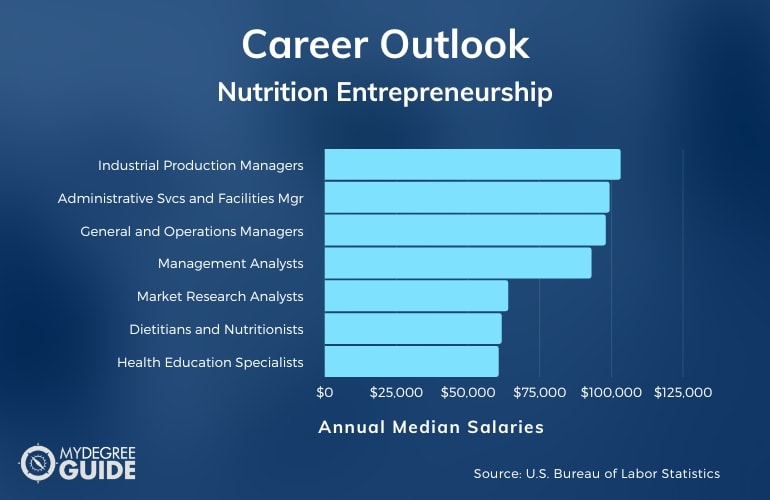If you’re interested in making a difference in the food and nutrition industry, then you might consider earning a nutrition entrepreneurship degree.

Graduates of this program are equipped with specialized skills to help solve problems and create innovative solutions within our current food industry.
Editorial Listing ShortCode:
The food and nutrition industry is a growing field with a high demand for professionals who understand fundamental nutrition principles and also have the necessary business acumen.
Universities Offering Online Bachelors in Nutrition Entrepreneurship Degree Programs
Methodology: The following school list is in alphabetical order. To be included, a college or university must be regionally accredited and offer degree programs online or in a hybrid format.
Arizona State University
Arizona State University offers an online program for a Bachelor of Science in Food and Nutrition Entrepreneurship. Some classes in the program are 7.5 weeks long, while others are 15 weeks long. Potential courses include Applied Food Principles, Food Service Purchasing, and Nutrition Management and Leadership. The curriculum emphasizes innovative problem-solving in the food industry.
Arizona State University is accredited by the Higher Learning Commission.
Johnson & Wales University
Johnson & Wales University offers a Bachelor of Science in Food and Beverage Entrepreneurship. Courses are 100% online. Some courses are 8 weeks long, while others are 16 weeks long. There are multiple start dates offered each year. The student-to-faculty ratio at JWU is just 15-to-1 to help ensure personalized attention.
JWU is accredited by the New England Commission of Higher Education.
University of Alabama
The University of Alabama offers a BS in Food and Nutrition that can be earned online. Most courses in the program do not have set login times, but a few do require on-campus practical experiences. The curriculum consists of courses such as Nutrition in the Life Cycle, Community Nutrition, and Nutrition Counseling. Applications are accepted year-round.
The University of Alabama is accredited by the Southern Association of Colleges and Schools Commission on Colleges.
University of Arizona
The University of Arizona offers an online program for a Bachelor of Science in Nutrition Sciences with an emphasis in Nutrition. Potential courses include Nutrigenomics, Applied Nutrition and Disease, and Sports Nutrition. A wide range of elective options are offered so students can tailor their coursework to their specific interests and career goals.
The University of Arizona is accredited by the Higher Learning Commission.
Weber State University
Weber State University offers a Bachelor of Science in Nutrition Education with concentrations in Integrative Nutrition and Sports Nutrition. The Integrative Nutrition option can be completed entirely online. The Sports Nutrition option is designed to prepare students for RDN graduate study.
Weber State University is accredited by the Northwest Commission on Colleges and Universities.
Online Nutrition Entrepreneurship Degrees

While the nutrition industry covers a wide variety of skills, knowledge, and careers, nutrition entrepreneurship focuses on developing solutions to challenges within the food industry. These solutions may include developing new businesses that meet a consumer need or researching and developing climate-friendly packaging materials.
Topics that you may cover as you earn your on-campus or online nutrition degree include:
- Business and entrepreneurship
- The business planning process for a product or service
- Food manufacturing and marketing
- Food service management
- Media and communication
- Sustainability
- Ethics in entrepreneurship
- Nutrition and innovation
- Marketing for entrepreneurs
- Pitching and planning new ventures
- Human nutrition
Nutrition entrepreneurship majors can build upon their food and nutrition knowledge with an understanding of how to successfully plan, finance, open, and market a new business venture.
As part of your program, you may work through the process of developing a business plan, gaining funding and selling to investors, and marketing your new nutrition venture. Some graduates use their skills to manage existing operations or regulate and market nutrition-related products and services.
The challenges facing the food industry are always evolving. Common challenges include developing eco-friendly packaging materials, managing inventory, and labeling food, to name a few.
Nutrition Entrepreneurship Careers & Salaries

After earning your bachelor in nutrition entrepreneurship, you may discover a wide variety of career opportunities that interest you.
The world of nutrition business encompasses many industries and provides numerous career paths, including management, marketing, research and development, and entrepreneurship. Based on data from the Bureau of Labor Statistics, here are the median salaries of some potential careers related to nutrition entrepreneurship.
| Careers | Annual Median Salaries |
| Industrial Production Managers | $103,150 |
| Administrative Services and Facilities Managers | $99,290 |
| General and Operations Managers | $97,970 |
| Management Analysts | $93,000 |
| Market Research Analysts | $63,920 |
| Dietitians and Nutritionists | $61,650 |
| Health Education Specialists | $60,600 |
| Food Service Managers | $59,440 |
| Production, Planning, and Expediting Clerks | $48,040 |
| Community Health Workers | $46,590 |
You may find numerous career possibilities available with a food and nutrition degree. Many career paths in this field are growing and pay above-average salaries. For individuals with culinary skills, there are opportunities to open restaurants or bakeries, mixing their food and nutrition knowledge with their business and management skills.
If you’re interested in innovation and problem-solving, you may focus on developing a food- or drink-related start-up that meets consumer needs. There are also numerous management positions in the nutrition industry, from food production and agriculture to service industries and market research.
Bachelor of Nutrition Entrepreneurship Curriculum & Courses

While the courses will vary depending on your program, below are some common types of courses you may take when completing your bachelor in nutrition entrepreneurship:
- Applied Food Principles: In this course, you’ll apply scientific principles to food preparation and production.
- Retail Food Service Operations: This course focuses on developing, evaluating, and managing retail food operations.
- Nutrition and Innovation: In this course, you’ll develop skills to identify and advocate for solutions to consumer needs in health and nutrition.
- Sustainability on the Farm: In this course, you’ll analyze multiple US food production approaches, focusing on increasing demand and environmental costs.
- Human Nutrition: This course focuses on the macro and micronutrients in our food and their impact on human health and disease.
- Introduction to Entrepreneurship: In this course, you’ll examine how to recognize business opportunities, develop new ideas, and identify target markets.
- Marketing for Entrepreneurs: This course teaches you how to market products and services to various audiences, including customers, suppliers, and investors.
- Accounting and Financial Analysis: This course introduces you to ethical accounting concepts related to operating, financing, and investing in businesses.
- Nutrition Communication: In this course, you’ll learn the best way to communicate evidence-based nutritional messages to various audiences.
- Pitching and Planning New Ventures: This course teaches you how to effectively develop and present business plans to investors.
In addition to nutrition and business courses, you may also be required to take some math and science-related courses, such as statistics or chemistry.
Admissions Requirements

While admissions criteria vary from program to program, listed below are some common requirements for admission into an online bachelors in nutrition entrepreneurship:
- Minimum GPA. Some programs require a minimum GPA from your high school courses or other undergraduate courses you may have taken.
- Academic transcripts. Many schools require a copy of your academic transcripts to date.
- Personal statement. Some colleges with nutrition majors require you to write a personal statement reflecting your goals and how this program relates to those goals.
In addition to the requirements listed above, some schools require or encourage you to submit your SAT or ACT scores, if applicable.
Accreditation

Regional accreditation is the process of ensuring a school and the courses it offers meet a predetermined standard of quality.
Regional accreditation is the most widely accepted type of accreditation, and it could affect your opportunities before and after completing your degree. For instance, attending an accredited schools is a precondition for some forms of financial aid.
If you choose to pursue higher degrees after your bachelors, some masters and doctoral programs only recognize bachelors degrees from regionally accredited schools. Plus, some employers only hire applicants with degrees from regionally accredited institutions. For additional school accreditation information, you can visit the US Department of Education’s website.
Financial Aid and Scholarships

As you pursue your food and nutrition degree, you may want to look into financial assistance opportunities to see if they’re available to you.
There are a variety of loans and grants that may be available through the federal and state governments. You can also look into scholarship opportunities that may be available through public and private institutions. Your school may offer financial aid options as well.
If you’re currently employed, you might look into financial assistance opportunities available through your employer. To learn more about potential financial assistance opportunities, you can visit the Federal Student Aid website.
What Is a Food and Nutrition Entrepreneurship Degree?

A food and nutrition entrepreneurship degree is a bachelor program that provides students with nutritional knowledge and business skills for the food and nutrition industry.
In addition to fundamental nutrition principles, you can gain knowledge in business, marketing, research and development, and management. Courses in this program help you develop the skills needed to identify opportunities and changes within the food industry and to provide innovative solutions.
Graduates may leave the program prepared to enter into a number of careers. Some go on to build their own nutrition- or food-related businesses.
What Can You Do with a Bachelor of Food and Nutrition Entrepreneurship?

Graduates with a food and nutrition entrepreneurship degree find numerous ways to use their nutrition, business, marketing, and management skills.
Some graduates pursue new business opportunities, creating and opening their own ventures within the food and nutrition industry. Other graduates seek management opportunities in various areas, including food production, marketing, agriculture, food services, and community health, to name a few.
According to the Bureau of Labor Statistics, careers for food service managers are on the rise, with continued growth anticipated in the future.
How Long Does It Take to Get an Online Bachelor Degree in Nutrition Entrepreneurship?

The time it takes to complete your bachelor in nutrition entrepreneurship degree will depend on your schedule and whether you attend full-time or part-time.
If you follow a traditional 16 week semester and attend full-time, it will generally take 4 years to complete your degree. If you follow an 8 week semester and are enrolled full-time and year-round, you may be able to finish in less time. Enrolling part-time will often extend your overall completion time.
Is an Online Bachelor’s Degree in Nutrition Entrepreneurship Worth It?

Yes, an online bachelor’s degree in nutrition entrepreneurship is worth it for many students. In this growing field, there is a need for individuals with the necessary nutrition and business skills.
If you are interested in starting or owning your own food business, being able to create or implement innovative solutions is often essential to meet customer needs. There is also a range of career opportunities in the food and nutrition industry.
According to the Bureau of Labor Statistics, careers in business and finance are anticipated to grow 7% over the next ten years. Food service managers are projected to have 10% job growth over the same period, which is faster than average.
Getting Your Nutrition Entrepreneurship Degree Online

Earning your degree in nutrition entrepreneurship can help you develop skill sets that are versatile and in-demand in the food and nutrition industry.
If you’re interested in opening your own business, pursuing management opportunities, or focusing on research and development in the nutrition industry, this major may be a good fit for you. Food and nutrition professionals are in high demand, and developing your business skills through a nutrition entrepreneurship degree could advance your expertise and marketability.
You can start looking into online nutrition entrepreneurship programs from accredited universities to find the one that best matches your interests and goals.
